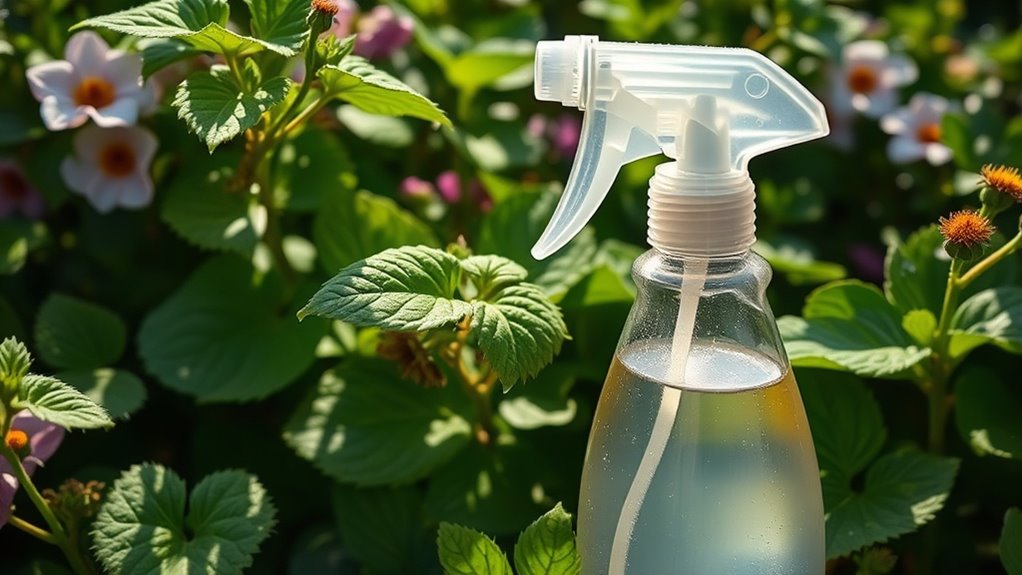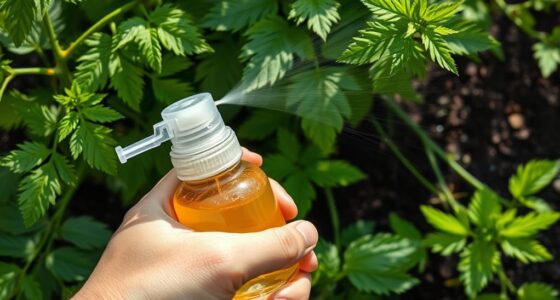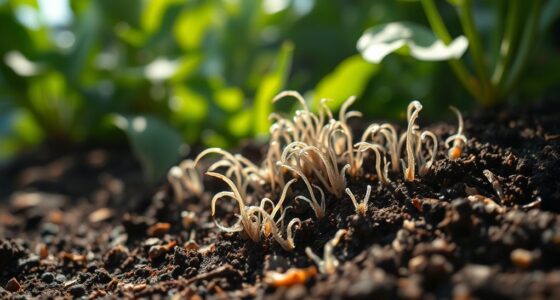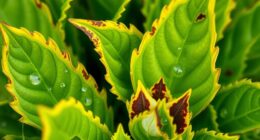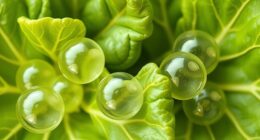To make a DIY natural insecticide, mix 1-2 teaspoons of biodegradable, fragrance-free liquid soap in a quart of water, ensuring it dissolves completely. Spray this solution directly on infested plants, especially on undersides of leaves, and reapply every 5-7 days or after rain. This eco-friendly spray targets soft-bodied pests like aphids and whiteflies without harming beneficial insects. Keep learning tips to maximize your garden’s health and pest management success.
Key Takeaways
- Use biodegradable, fragrance-free liquid soap mixed with water (1-2 teaspoons per quart) for an effective, eco-friendly insecticide.
- Spray directly on pests and undersides of leaves, focusing on hotspots for best results.
- Apply in early morning or late evening to minimize plant stress and maximize pest control.
- Repeat every 5-7 days and after rain to maintain pest suppression.
- Combine with other natural methods for integrated pest management and healthy garden ecosystems.
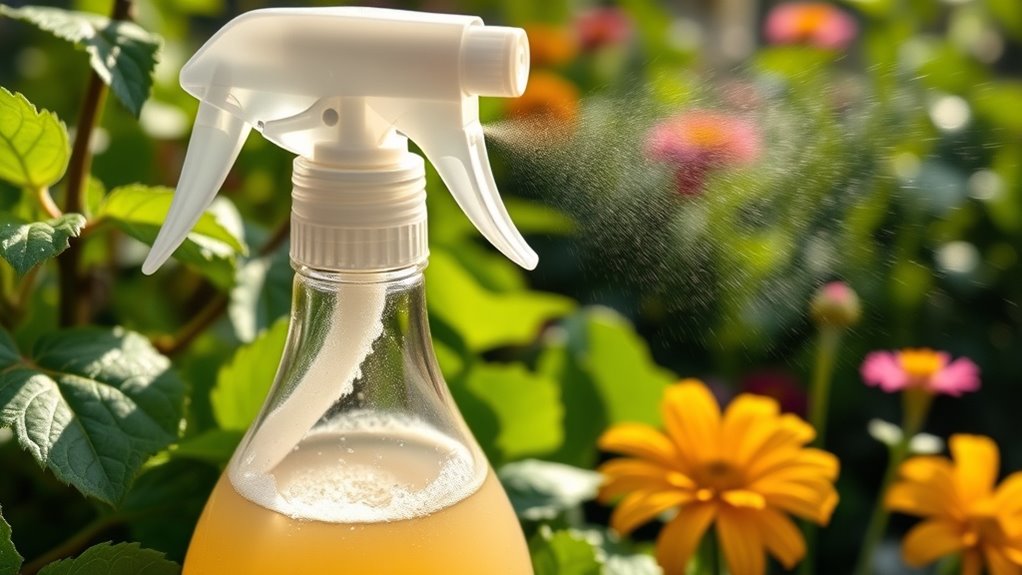
Are you tired of using chemical insecticides that harm your garden and the environment? Switching to natural solutions can be both effective and eco-friendly, especially when you understand how to use soap sprays properly. These DIY insecticides serve as excellent chemical alternatives, targeting pests without killing beneficial insects that keep your garden healthy. Beneficial insects like ladybugs, lacewings, and predatory beetles naturally control pest populations, but chemical insecticides often wipe them out along with pests. By choosing soap sprays, you create a gentle barrier that pests dislike, while still allowing helpful insects to thrive.
Making your own soap spray is simple and affordable. You only need a few ingredients: liquid soap—preferably biodegradable and free from added fragrances or dyes—and water. Mix about one to two teaspoons of soap into a quart of water, ensuring the soap dissolves completely. You can also add a small amount of vegetable oil to help the solution stick to insect bodies. This mixture works by suffocating soft-bodied pests like aphids, spider mites, and whiteflies. Because soap disrupts their cell membranes and dehydrates them, it’s a targeted approach that doesn’t linger long in the environment or harm plants.
Make your own eco-friendly soap spray with simple ingredients like biodegradable soap and water.
Applying soap sprays correctly is *vital* for their effectiveness and safety. Spray directly onto infested plants, focusing on the undersides of leaves where pests hide. Make sure to cover all affected areas thoroughly but avoid excessive application, which can cause leaf damage or stress plants. For best results, apply in the early morning or late evening when temperatures are cooler, and pests are more active. Repeat treatments every 5 to 7 days as needed, especially after rain, which can wash away the soap. Consistency is key to controlling pests without resorting to harsh chemicals. Using a rainwater capture technique can help you conserve water and ensure your plants receive consistent moisture during treatments.
One of the main benefits of using soap sprays is their safety for beneficial insects. Unlike many chemical alternatives, these sprays are selective and won’t harm pollinators or predatory insects that naturally keep pest populations in check. This balance is essential for maintaining a thriving, sustainable garden. Plus, soap sprays are biodegradable, leaving no toxic residues in your soil or water supply. They’re a simple, effective way to manage pests while supporting the health of your garden ecosystem. With just a few ingredients and regular application, you can keep pests at bay naturally and protect your garden’s beneficial insects for years to come.
Frequently Asked Questions
How Often Should I Reapply Soap Sprays?
You should reapply soap sprays every 7 to 10 days to maintain effective pest control. Reapplication frequency depends on pest severity and weather conditions—more frequent if pests persist or after rain. Keep an eye on your plants and reapply at the first sign of pests or damage. Consistent pest control timing helps prevent infestations and keeps your garden healthy, ensuring your soap spray remains effective.
Can Soap Sprays Harm Beneficial Insects?
Be mindful of your garden’s beneficial insect safety when using soap spray impact. While soap sprays target pests effectively, they can sometimes harm helpful insects like bees and ladybugs if misapplied or overused. To protect these beneficial bugs, spray early in the morning or late evening, avoiding flowering plants. Proper application minimizes harm, helping your garden stay balanced, beautiful, and buzzing with beneficial insects rather than battling pests.
Are Soap Sprays Safe for Edible Plants?
You wonder if soap sprays are safe for edible plants. Generally, they’re safe when used properly, minimizing pesticide residue and ensuring plant safety. Always spray during cooler parts of the day and avoid applying too much, as excess soap can harm plants. Follow the recommended dilution and frequency to protect your crops. When used correctly, soap sprays are an effective, safe way to manage pests without risking your harvest’s safety.
What Ingredients Make an Effective DIY Soap Spray?
Did you know that using the right ingredients can make your soap spray 10 times more effective? For an effective DIY soap spray, you need plant-safe ingredients like pure castile soap or vegetable-based soaps combined with water. Effective soap combinations include a few drops of neem oil or garlic extract for extra pest control. Always test your mixture on a small plant area first to guarantee safety and effectiveness.
How Do I Store Leftover Soap Spray Solution?
When storing leftover soap spray solution, follow these storage tips to maintain its effectiveness. Keep it in an airtight container, away from direct sunlight and extreme temperatures. Label the container with the date you made it. Typically, the shelf life is about a week to two weeks, but always check for changes in smell or appearance before use. Proper storage guarantees your spray remains safe and effective for future applications.
Conclusion
Now that you know how to make soap sprays, your garden is practically invincible against pests. Just a simple mixture can turn you into a gardening superhero, protecting your plants naturally and effectively. Keep this DIY trick up your sleeve, and you’ll be amazed at how effortlessly your garden thrives without harmful chemicals. Remember, with this powerful natural insecticide, your garden’s health is unstoppable—ready to conquer pests like a force of nature!
